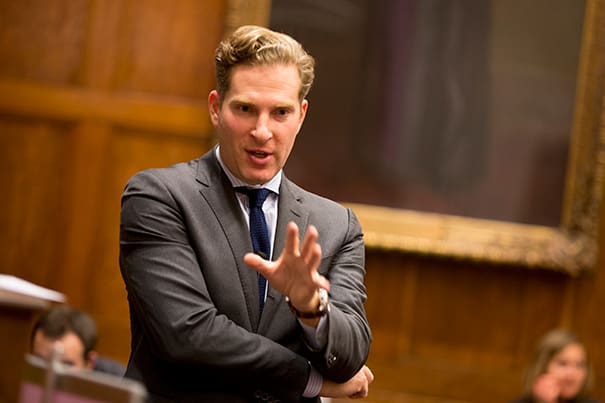Noah Feldman is a Harvard law professor and a prolific author. In a May article on a court striking down the District of Columbia’s concealed carry prohibition, Feldman somewhat grudgingly, but honestly, explained why Second Amendment supporters keep winning in the courts.
With that, the court embraced the old slogan that if you outlaw gun ownership, only criminals will have guns. The court then held that the regulation wasn’t narrowly tailored because the city would have to prove that its scheme made people safer than any less restrictive alternative. And it said it was “skeptical” that such proof could ever be possible. The regulation would only be narrowly tailored, he said, if it were “targeted at keeping guns away from people who are likely to misuse them or situations where they are likely to be misused.”
Then Feldman included this bombshell (for someone on the left) statement:
City lawyers tried to argue that the regulation simply restricted the time, place and manner of bearing arms, limitations that are permissible even when applied to the free-speech protections of the First Amendment. But the court replied that the analogy was flawed — which of course it is. A law that prohibited you from speaking while on the street but let me speak while at home wouldn’t be permissible. The analogy to free speech is one that belongs to advocates of gun rights, not to the other side.
The U.S. Court of Appeals for the D.C. Circuit will have to review this decision. But it’s worth noting that, astonishing as the reasoning sounds, it makes logical legal sense once the right to bear arms is treated as a fundamental right comparable to free speech.
Feldman is now back again, this time in the aftermath of a ruling holding allowing restrictions on posting plans for 3D -printed weapons online.
Although the impulse to block the easy creation of untraceable weapons is admirable, the court got it wrong. The First Amendment can’t tolerate a prohibition on publishing unclassified information – even if the information is potentially harmful.
I admire Feldman’s willingness to apply logic to the subject at hand, even though he dislikes the outcome. You don;t see that very often in the fight over the Second Amendment. Feldman’s logic is impeccable.
What’s more, Congress in its wisdom hasn’t prohibited Americans from making their own AR-15 parts at home. The fact that the conduct is legal is an overwhelming reason to conclude that directions on how to do it can’t be prohibited without violating freedom of speech.
Judge Edith Jones said as much in dissent. I don’t agree with Jones, a Ronald Reagan appointee, that often, but when you’re right, you’re right. She pointed out that the panel never squarely addressed the question of Defense Distributed’s likelihood of success on the merits in upcoming litigation.
When free-speech rights are in the balance, a long delay in publication is as good as the denial of the First Amendment. Defense Distributed has already been prohibited from speaking for three years.
I disagree with Feldman a fair amount. He has written, for example, that the interpretation of the Second Amendment as an individual right started with the Heller case in 2008. That’s clearly incorrect. But writing about the First Amendment, and the implications in this case, he gets it right.
Hats off to Mr. Feldman.
©2016 by Dean Weingarten: Permission to share is granted when this notice is included.
Gun Watch






Well, that’s refreshing. A university professor who has the intellectual integrity to apply logic and actually understand the opposition, even if he disagrees with them. Kudos to you, good sir.
If you get a chance, listen to Randy Barnett who is a Constitutional Law Professor at Georgetown. He makes some fairly simple statements, like “The Constitution is the law that governs those that govern us,” and, “It is a charter that subjects rulers to the rule of law, assuming they follow it, which is what they’re supposed to do,” and, “First come rights of individuals, then comes government.”
Or longer ones like, “If the Constitution is the law that governs those that govern us, then they (government) can no more change the laws that govern them by themselves, than we can change the laws that govern us without going through the proper legislative process.”
The Rubin Report just did a great interview with him: https://youtu.be/JcJTPK2KHcs
Well worth the hour.
I have a question for the author or anyone that may know the answer. When did “the interpretation of the Second Amendment as an individual right start?” If not with the Heller case in 2008? We believe that was the original intent which everyone here does, but was there another case before Heller? Or some other legal thingy the author is referring too? Heller put it in stone for now and I think that is why Feldman said that.
In the Dredd Scott decision by the USSC in 1857, the Supreme Court reaffirmed the right to own Blacks as slaves.
In the body of the decision, one of the reasons the USSC gave for not freeing the blacks was because they could bears arms without restrictions as free American were able to do so at that time.
Just one example of many of the historical acceptance that the RKBA without infringement was the norm for much of our history.
That’s what I was looking for something like the Dread Scott with legal precedent or wording in such that it was an individual right. We on here believe it was the original intent, but others debate it as a general right only for militias. Even if “what is a militia, but the body of men.”
The militia is all the people that are not government employees. And the militia act of 1792 that designated all free men between eighteen and under forty five as being already part of militia is still the law of the land.
The Militia Act of 1792, Passed May 8, 1792, providing federal standards for the organization of the Militia.
An ACT more effectually to provide for the National Defence, by establishing an Uniform Militia throughout the United States.
I. Be it enacted by the Senate and House of Representatives of the United States of America, in Congress assembled, That each and every free able-bodied white male citizen of the respective States, resident therein, who is or shall be of age of eighteen years, and under the age of forty-five years (except as is herein after excepted) shall severally and respectively be enrolled in the militia, by the Captain or Commanding Officer of the company, within whose bounds such citizen shall reside, and that within twelve months after the passing of this Act. And it shall at all time hereafter be the duty of every such Captain or Commanding Officer of a company, to enroll every such citizen as aforesaid, and also those who shall, from time to time, arrive at the age of 18 years, or being at the age of 18 years, and under the age of 45 years (except as before excepted) shall come to reside within his bounds; and shall without delay notify such citizen of the said enrollment, by the proper non-commissioned Officer of the company, by whom such notice may be proved.
The language in Dredd Scott is mere dicta and not a holding of the Court. The issue of the right to bear arms as an individual versus collective right was not in issue or argued. It is just as proper to say that the right of blacks to bear arms would be the same as for any white, and that could be either an individual or collective right connected to service in the militia.
Perhaps “dicta”, but what it does speak to is the unspoken assumption of the time, about what a free citizen represents, and what they are free to do. This is what it says from the decision. At the end, it is speaking of citizens, practicing the freedoms of any free citizen, “and to keep and carry arms where ever they went.”
“It would give to persons of the negro race, …the right to enter every other State whenever they pleased, …to sojourn there as long as they pleased, to go where they pleased …the full liberty of speech in public and in private upon all subjects upon which its own citizens might speak; to hold public meetings upon political affairs, and to keep and carry arms wherever they went.[27]
No collective right of being in a militia to keep and bear arms is even hinted at. All of the activities are of individuals performing individual actions, individual rights. Plus, all of the first ten amendments were about individual rights. They were specifically put in the constitution because the anti-federalists were fearful that a centralized government would “infringe” those rights of the people. The fact that the last clause of the second amendment says. ” the right of the people, to keep and bear arms, shall not be infringed” and not some collective phrase saying the “right of the states to maintain a militia” , says it all.
That entire opinion is badly compromised by the fact we learned long after that the president improperly/illegally pressured the chief justice to deliver a favorable verdict for slavery. Very sordid history with that case, and even if it did reference an individual right to firearms, I’d be happy with it never again being referenced as precedent for anything (well, other than a civil war). Regardless the issue of slavery, the whole proceeding was illegitimate.
I disagree. I see this case as a perfect example of the fallacy of depending on the USSC as the final arbiter of any important question; especially when it comes to our most important rights, like my second amendment rights.
In the end, being shown that the USSC is just a bunch of fallible human beings that are swayed by the frailty of human fears and weaknesses, is exactly what is needed for us to realize the emperor has no clothes, or in this case, no black robes.
“When did ‘the interpretation of the Second Amendment as an individual right start?’”
IMO, this interpretation started the first day the U.S. Senate began debating the wording of the Second Amendment. Whether or not SCOTUS ever interprets anything has no bearing on its status as a natural, civil and Constitutionally protected right except to give supposed (and ultimately unenforceable) opinion to resolve a specific case before them.
I believe that it was FDR when faced with a negative SCOTUS ruling who said, “That’s fine, now let’s see them enforce it.” The reason being that while the SCOTUS is the only court established by the Constitution as the Judicial Branch of the federal government, the president and his DOJ decides who gets prosecuted and when. Ask Hillary about that.
It was Andrew Jackson(Cherokee Trail of Tears). But FDR was even worse. Packed the court to get his way. And the criminal in power now takes the cake…
SCOTUS has a 240-year history of defining it as an individual Right.
http://www.davekopel.org/2A/LawRev/35FinalPartOne.htm
Feldman is a snake. He’s not defending 1A or 2A. He’s just trying to find another way to attack them.
“He has written, for example, that the interpretation of the Second Amendment as an individual right started with the Heller case in 2008. That’s clearly incorrect.”
Is it? In the context of rulings from the U.S. Supreme Court, it most definitely is correct, as that court had never, other than Miller, weighed in on a Second Amendment issue. And it was Miller, in fact, that gave rise to the theory that the Second was a collective, not an individual right.
The Miller case never said anything about the second amendment as a “collective” right.
The USSC only talked about whether a short barreled shotgun was a suitable weapon for the militia.
The USSC decided, with no feed back from the original defendant that it was not, and upheld the original change against Miller.
Attributing some collective right from the Miller decision was made up out of whole cloth by the Anti-second amendment crowd.
Yup. US v. Miller actually upholds the individual right to at least an AR-15. They were totally wrong about the short shotgun, but the decision recognized the existence of the “unorganized militia” and therefore the right to common militia-appropriate arms. The anti-2A version sucks d**k.
http://caselaw.findlaw.com/us-supreme-court/307/174.html
Yep. Short barreled “trench guns”, (shot guns) were used extensively in World War One by regular military troops.
What it did was imply that the Second Amendment only extended to arms suitable to use by the militia, and that was the springboard for the collective rights theory.
SCOTUS has a 240-year history of defining it as an individual Right.
http://www.davekopel.org/2A/LawRev/35FinalPartOne.htm
Not a SCOTUS ruling, but Nunn v Georgia covers the COTUS 2A implication against the laws of the state of Georgia in 1846. Constitutionally faithful justices all over America believed in the Second Amendment at the time, and also Article VI clause 2 which rendered the Second Amendment supreme to state law
http://www.constitution.org/2ll/bardwell/nunn_v_state.txt
Article III of the Constitution of the United States of America establishes in Section 1. the supreme Court, in Section 2. itemizes the jurisdiction of the supreme Court, and in Section 3. discusses treason. Nowhere in the Constitution is the Supreme Court given the authority to ‘interpret” the Bill of Rights, or any other amendment. This appropriated right to interpret is what has resulted in abominations such as Roe v Wade, the concept that ANY baby born inside the borders of the U.S. is automatically an American citizen (try that trick anywhere else in the world) and other rulings where the justices (at least 5 or more) “found” the rights they were looking for in the wording of amendments never intended to be used in that regard.
I refer the readers to “Men in Black” by Mark Levin.
Just because tyrants are wearing black robes, makes them no less the tyrants.
Thomas Jefferson warned this would happen.
My realized worry is an activist SCOTUS. Instead of just judging the Constitutionality of law in a strict sense they are now looking at the out come of the law. Weather or not a justice likes the outcome of the law plays no role in the Constitutionality of the law.
They do not even apply their own criteria across other laws. Texas can’t require abortion clinics to meet the same codes as a hospital. That would be to restrictive of someone’s right to choose. That same reasoning should be applied to the 2nd amendment as an individual right. Not allowing state regulations from imposing restrictions that inhibit ownership. If my taxes can be used for abortion my taxes should also be used to arm law abiding Americans.
The USSC has been “activist” since FDR packed the courts with progressives after the originalist judges decided that FDR was acting outside the constitution with the laws he passed during the Great Depression.
Roe versus Wade was such an activist decision, to overturn long established law to make abortion legal. Then, of course, the “interpreted” right to privacy that allowed a woman to murder her unborn child, did not cover that same woman’s right to put some outlawed drug into her body, though it would hurt no one but herself.
Yep. That’s being consistent.
Remember Heller was 5-4, which means that 4 of our supreme court judges actually thought that the second ammendment didn’t apply to the individual. There is no way that you can honestly believe that something that’s written “right of the people” isn’t for the people. It’s always been about activism for one side.
Exactly Other Tom. As part of the dissenting opinion, Stevens speaks to the collectivist opinion since Miller, created by progressive judges, in the spirit of the collectivist mind set of the communist spawned Liberal/progressives. But the most telling paragraph is at the end of their dissent. It speaks to the elitist and arrogant mind set that could never imagine the federal government limiting it’s power, the “tools”, to control the people.
“The Court would have us believe that over 200 years ago, the Framers made a choice to limit the tools available to elected officials wishing to regulate civilian uses of weapons…. I could not possibly conclude that the Framers made such a choice.”
After taking ConLaw in law school, it was and is my opinion that the Supremes have always worked backwards from the desired result, and then used the level of scrutiny required to achieve that result. And that was long before FDR.
Whether. Don’t know about interpreting the 2nd. My right to defend myself and my family “by any means necessary ” began the moment a neanderthal discovered that a pointy stick provided food, shelter, clothing and defense from critters that wanted him for dinner.
@ThomasR
“The Militia Act of 1792, Passed May 8, 1792, providing federal standards for the organization of the Militia.”
The Militia Act is just that; legislation. The constitution calls-out the right of the people (people first, government subordinate). The Militia Act concerns militia founded and designed to augment the regular army in defense of the nation as a whole. The act says nothing about how states and towns organize (if at all), a militia for use in matters internal to the state (such as self-defense of the state/town against Indian raids, or attacks from other states, or as police; the official Militia called to defend a single state or town from internal attack remains an interesting question regarding the times).
I’ve thought since the creation of the draft everyone that has filled out a draft card is part of the militia. Or another more recent precedent to the effect of all able body men and soon women being part of the militia. The problem with both is the upper age limit. Not that the militia has much to do with our individual right to bear arms. The 2nd is a sentence divided into separate ideas by the use of commas. So there are two separate ideas contained in our 2nd amendment rights.
Interesting thought about militia = signed-up for draft. Hadn’t ever considered that.
The educating of America leads to muddled thinking. What is “acceptable truth” is not truth at all; what is “truth” is decried at “inconsiderate”. (There is an old book, wherein a statement about the collapse of civilization is described as a time when “..good has become evil, and evil has become good). Much of what we know to be fact, is not fact at all (thank you Mark Twain).
And so it is with how this government was supposed to work, and how it began to be corrupted so soon after the ratification of the Constitution. Until after 1865, there was little confusion about the relation of people to the states, and people and states to the national government. So much has changed that we (POTG, et. al.) almost cannot make our minds untangle the situation. In the beginning, the Constitution was almost exclusively a brake on federal government; states to be left pretty much alone. Since 1865, the federal constitution and state laws are sometimes one and the same; sometimes not. Sometimes we cheer the feds taking action at the local level; sometimes not (mostly depends on whose ox is being gored).
To bring this back to the beginning, The Militia Act was not a constitutional amendment expanding or restricting federal government. As mere legislation, it was considered proper law INSOFAR as it determined how states would regulate a militia that would be integrated (or become) with the national army (the founders were not impressed with the state militias “loaned” to the central government to fight the English Regulars). So soon after the ratification of the constitution, the national legislature was not about to have the central government making law about how states would operate militias not designed to become part of the national armies. Those militias could be one and the same, but the Militia Act was restricted to state levies for national purposes (one just might see the beginning of the Nat’l Guard). Under the second amendment, the central government could not dictate the organization of a militia to integrate with the army, while simultaneously prohibiting the very members of that militia from having personal and private armament (because the states needed armed bodies for militias operating inside the individual states).
The individual right to bear arms goes back to the English Bill of Rights of 1689, Article 7: “That the subjects which are protestants, may have arms for their defence suitable to their condition, and as allowed by law.”
The British Commonwealth did its best to extinguish all of the Rights enumerated, but they are still our rights. Throughout medieval history, all men carried daggers to cut their meat (and settle quarrels quickly and permanently), and most were assigned to local militias governed by their local lord, and carried either farm implements or actual weapons depending on their level of wealth. The British public has always been an armed one. Nowadays they only carry cell phones…
Comments are closed.